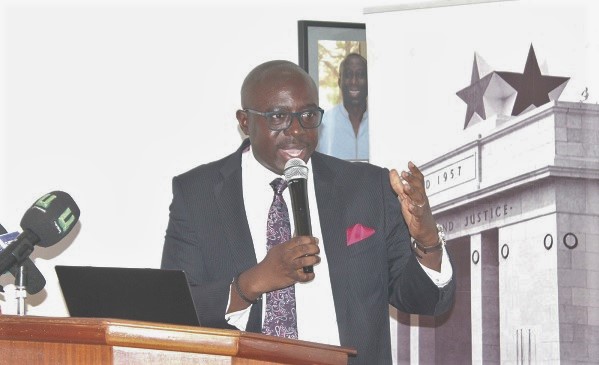
President’s decision to abort December referendum unjustifiable — Lecturer
A law lecturer at the Ghana Institute of Management and Public Administration (GIMPA), Mr Clement Kojo Akapame, has described the government's decision to abort the December 17 referendum as legally unjustified.
He stated that withdrawal of the bills for the amendment of the Constitution in respect of articles 243(1) and 55(3) had gone beyond maturity stage and as such neither the executive nor Parliament could withdraw it.
"Withdrawal can only happen at the polls on December 17. We as electorate can withdraw it by voting either a 'Yes' or 'No'”, he stated.
He explained that the bill could only have been withdrawn on December 17 by the electorate by voting 'No' suggesting that the President's decision be challenged at the Supreme Court to ensure clarity.
Mr Akapame was speaking at the seventh Accra Dialogue organised by the Friedrich Ebert Stiftung and the Institute of Law and Public Affairs (ILPA) on the topic "The Aborted 17th December Referendum: Justified? What next?"
Timing
Mr Akapame said the timing for the abortion of the referendum was untoward hence the need to seek redress from the Supreme Court to prevent a recurrence adding that "the next time it could be a day to the election,"
On Sunday, December 1, 2019, President Nana Addo Dankwa Akufo-Addo instructed the Minister for Local Government and Rural Development, Hajia Alima Mahama, who was spearheading the process for holding the referendum of December 17, 2019 on behalf of the government, to abort the process and see to the withdrawal of the bills for the amendment of the Constitution, both in respect of article 243(1) and article 55(3).
Justified
A Senior Lecturer at the Institute of African Studies of the University of Ghana, Dr Michael Kpessa-Whyte, who was also a panellist at the event, noted that the election of Metropolitan, Municipal and District Chief Executives (MMDCEs) on partisan lines could bring about divisive ethnic tendencies at the local level which was not healthy for peace and democracy.
He challenged the current means of appointing MMDCEs proposing that there should be other means of making MMDCEs accountable in order to reduce the extensive powers of the President.
Electoral College
On the backbone of that argument, Dr Kpessa-Whyte suggested the constitution of an electoral college made up of some selected assembly members, heads of state institutions at the local government level, women, young people, chiefs and religious leaders to elect MMDCEs.
That, according to him, was the most effective way to ensure accountability at the local level.
“The President appoints someone and dumps the person on the local people as such, if the person underperforms, it becomes difficult for the people to demand accountability and that is why an electoral college is needed at the local level, those people can demand accountability better since they represent the voice of the local people.
“I think that we must not make parties the only vehicle for development all though they are equally important but at this material moment, we should create a system that allows people who do not want to be associated with parties to also be involved” he added.
